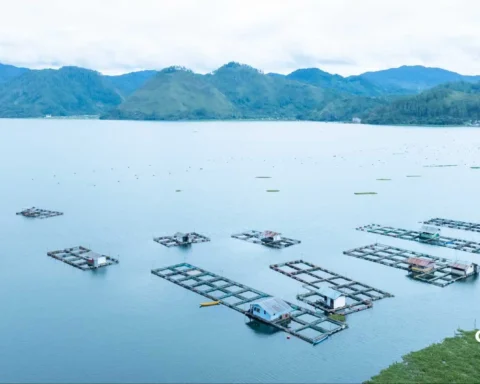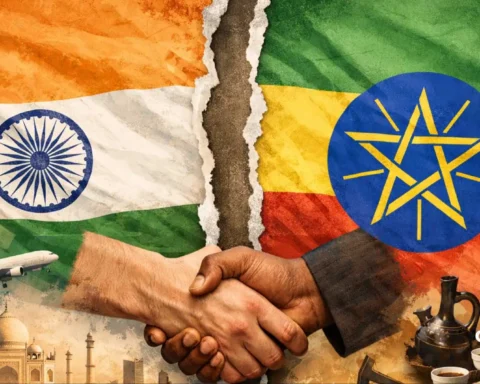“A nation’s greatness is not measured by its material wealth, but by the minds it cultivates and the dreams it dares to chase.” This sentiment, echoed by visionaries worldwide, captures the essence of India’s remarkable journey in building a world-class talent pool.
From the bustling campuses of the Indian Institutes of Technology to the innovation hubs of Silicon Valley, Indian scientists and engineers have left an indelible mark on the world. Yet, what truly sets India apart is not just the scale of its talent but the way it has turned its global diaspora into a powerful engine for national progress.
Today, as African nations seek to leapfrog into the knowledge economy, India’s experience offers a compelling blueprint: harness the expertise, networks, and passion of the diaspora to spark innovation, drive research, and inspire the next generation of knowledge leaders at home.
While examining the complexities and shared advantages, the article also identifies gaps, not as shortcomings, but as avenues for potential progress.
Table of Contents
Education and Skills: Building Human Capital for the Future
The rapid transformation of economies and societies in East Africa has placed a premium on education and skills development, particularly in the fields of technical and vocational education, as well as higher learning. As the region faces persistent challenges such as youth unemployment and a mismatch between graduates’ skills and labor market needs, a range of innovative initiatives—led by UNESCO (BEAR II), Indian educators, and Indian technology companies—are reshaping the landscape of human capital development.
India’s Expanding Role: Capacity Building and Knowledge Diplomacy
India’s partnership with Africa, particularly East Africa, is rooted in decades of educational cooperation and capacity building. This relationship has deepened in recent years, with India emerging as a key provider of scholarships, training, and institutional partnerships.
Key Indian initiatives include
Scholarships and Training: Over 25,000 African students are currently enrolled in Indian institutions, and technical and educational training slots have been utilized under the India-Africa Forum Summit. India pledged 50,000 scholarships to African students during the India-Africa Forum Summit III (IAFS-III) in 2015. As of 2024, more than 32,000 scholarships have been awarded to African students.
Indian civil service training programs have also benefited thousands of African officials.
E-Learning and Technology Transfer: The Pan-African e-Network links Indian universities with African institutions, facilitating tele-education and telemedicine. Ten IT centers have been established, and IIT Madras has opened overseas campuses (Zanzibar). India’s e-Vidya Bharati initiative has reached over 15,000 African students in 22 countries. Mindspark serves over 300,000 active users in India, the UAE, and Africa. India’s EdTech sector is the third-largest globally.
Institutional Partnerships: Indian universities, such as the Indira Gandhi National Open University (IGNOU), collaborate with their African counterparts to promote distance learning. The National Forensic Science University has established a campus in Uganda, further expanding access to specialized higher education.
Grassroots Empowerment: Indian civil society and private sector organizations, such as SEWA and Barefoot College, are training African women in solar energy technology, promoting entrepreneurship and community development. This strategy of knowledge diplomacy enhances India’s soft power and supports Africa’s development goals. The “Study in India” program offers over 8,000 courses to foreign students, promoting affordable, high-quality education.
These details underscore the transformative impact of coordinated international efforts—led by UNESCO, Indian educators, and tech companies—in building human capital and equipping East Africa’s youth with the skills needed for the future.
The Role of Indian Tech Companies and Educators
Indian technology companies and educators are increasingly active in East Africa’s education sector. They provide:
- Curriculum development and digital content for African universities and vocational institutes.
- Edtech solutions that support remote learning, digital literacy, and upskilling.
- Faculty exchange and training programs that build local teaching capacity and foster innovation.
The Role of the Global Indian Community
The global Indian community—encompassing the Indian diaspora, civil society, and private sector—plays a rapidly expanding and multifaceted role in building human capital and transforming education and skills development in East Africa.
Diaspora as a Bridge for Knowledge and Skills
- The Indian diaspora is one of the world’s largest, with an estimated 35 million people globally. India has successfully leveraged this vast network for “brain gain,” turning its global community into a source of expertise, mentorship, and investment for both India and its partner countries, including those in Africa.
- Thousands of Indian teachers are present in African countries, including Libya, Zambia, and Ghana, directly contributing to local education systems and capacity building.

Private Sector and Public-Private Partnerships
Indian multinationals and tech companies are increasingly active in Africa, providing:
- Curriculum development and digital learning platforms – Tata International’s university collaborations in Africa are robust in scholarships, industry-linked student projects, and skills development, but do not extend extensively into joint academic research or curriculum development.
- Industry-relevant training in sectors such as IT, vehicle manufacturing, and gemology.
- Public-private partnerships (PPPs) are emerging as a powerful model for collaboration. For instance, in 2017, 1,500 Africans participated in short-term professional training courses in India, many of which were facilitated by non-state actors and funded through innovative PPPs.
Diaspora-Led Innovation and Mentorship
Members of the Indian diaspora, many of whom have excelled in STEM (science, technology, engineering, and mathematics) fields globally, are uniquely positioned to mentor African students, facilitate research collaborations, and support start-ups. The diaspora’s experience with India’s rapid expansion of higher education and STEM expertise offers valuable lessons for African countries seeking to build their innovation ecosystems.
Triangular and Trilateral Cooperation
The global Indian community also supports trilateral partnerships—for example, collaborating with Northern agencies to deliver training for African professionals using Indian expertise and infrastructure. Such models multiply impact by pooling resources and knowledge from multiple regions.
Inspiration from India’s Experience
India’s experience in expanding its STEM talent pool through proactive diaspora engagement offers a compelling blueprint for African countries seeking to harness their global talent for national development. Several key lessons and strategies emerge from the Indian model.
Policy Incentives for Diaspora Engagement
India’s Prime Minister, Narendra Modi, has prioritized diaspora engagement in the country’s development strategy, offering tax exemptions and incentives to encourage skilled professionals to return to or contribute to India’s scientific and technological sectors. This approach has led to the establishment and leadership of major companies, such as Wipro and Reliance Industries.
Lesson for Africa: African governments can design targeted incentive programs—such as tax breaks, research grants, and streamlined business registration—for diaspora scientists and entrepreneurs willing to return or collaborate with local institutions.
Formal Programs for Knowledge Exchange
India’s VAIBHAV Fellowship Program exemplifies how structured initiatives can connect distinguished diaspora scientists with domestic research and academic institutions. This program promotes collaborative research, knowledge transfer, and best practices in critical STEM fields, including quantum technology, healthcare, and agriculture.
Lesson for Africa: African countries could establish similar fellowship or visiting scholar programs to facilitate the transfer of advanced knowledge, research skills, and global networks from their STEM diaspora to local universities and innovation hubs.
Diaspora for Crisis Response and Innovation
During the COVID-19 pandemic, India’s ability to rapidly scale up vaccine production was significantly enhanced by the expertise of diaspora scientists who returned with cutting-edge knowledge from Western research institutions. This demonstrates the diaspora’s role as a force multiplier in national innovation and crisis management.
Lesson for Africa: By building robust channels for diaspora engagement, African countries can mobilize their global talent pool to address public health emergencies, technological disruptions, and other national challenges.
Building Institutional Linkages and Science Diplomacy
India’s approach includes creating institutional mechanisms, such as the India Centre for Migration and the Prime Minister’s Global Advisory Council, to systematically identify and engage top diaspora talent. These bodies facilitate “brain circulation” rather than “brain drain,” ensuring a two-way flow of expertise and innovation.
Lesson for Africa: Establishing dedicated diaspora engagement offices or advisory councils can help African governments systematically map, connect, and collaborate with their STEM diaspora, both for research and policy development.
Encouraging Bottom-Up, Location-Specific Innovation
India’s massive expansion of tertiary education, particularly in STEM, was driven by a bottom-up approach that encouraged local innovation and adaptation to regional needs. This created a large, highly skilled human capital base, enabling India to export scientists and technologists globally.
Lesson for Africa: African countries can promote STEM education reforms tailored to local challenges and opportunities, drawing on diaspora expertise to design curricula, mentor students, and foster entrepreneurial ecosystems.
Mutual Benefit and Global Partnerships
India’s model emphasizes that diaspora engagement should be mutually beneficial, not just for financial remittances but for technical assistance, collaborative research, and the exchange of ideas. The Indian diaspora’s global network has helped position India as a leader in ICT, AI, and life sciences, with Indian-origin professionals heading major global corporations.
Lesson for Africa: African nations can encourage their diaspora to invest in local start-ups, mentor young STEM talent, and advocate for Africa’s interests in global scientific forums.
Private Sector and Multinational Collaboration
Global corporations such as IBM, Google, and Nestlé have recognized the value of hiring diaspora professionals to bridge local and global expertise. In Africa, similar partnerships could be fostered, leveraging diaspora talent to drive research and development (R&D) and innovation in key sectors.
In summary
India’s success in mobilizing its STEM diaspora demonstrates the transformative potential of strategic incentives, formal engagement programs, institutional linkages, and mutually beneficial partnerships. If African countries adopt and adapt these lessons – recognizing, incentivizing, and integrating their diaspora – they can accelerate the development of a robust, globally competitive STEM talent pool.
Addressing Challenges and Looking Ahead
Despite significant progress, challenges remain. Critics note that some initiatives may not fully align with the specific needs of African universities, particularly in terms of graduate employability and research capacity. There is a pressing need to ensure that educational programs are closely linked to labor market demands and that they foster not only employment but also entrepreneurship and innovation.
UNESCO’s ongoing strategy for TVET (2022-2029) and India’s evolving knowledge diplomacy both emphasize lifelong learning, digital and green skills, and inclusive access—all crucial for sustainable development in East Africa.
Recommendations
The path forward is to include the erasure of gaps in policy. Some recommendations are:
Establish Employer Advisory Board
To align education with labor market needs, institutions should establish regular feedback loops with employers and industry leaders, integrate work-based learning, and use technology for real-time feedback. Public-private partnerships and diaspora engagement enrich programs with global expertise. Continuous monitoring of graduate outcomes and employer satisfaction refines educational offerings, fostering employability and entrepreneurship while responding to economic demands.
Expand Joint Research and Curriculum Development
India-Africa educational partnerships are thriving in scholarships and training but lack development in joint academic research and curriculum co-creation. To bridge this gap, both regions should establish collaborative research centers and co-authored academic programs, especially in STEM fields. Indian universities like IIT Madras and the National Forensic Science University can lead by fostering innovation, local capacity, and relevance to both African and Indian contexts.
| Recommendations for East Africa (Education Sector) | |
| Note: The quantitative targets and figures presented in this table are indicative and intended to guide planning and monitoring. All final targets should be set in alignment with relevant government policies, institutional priorities, and official projections. | |
| Recommendation Area | Measurable Outcome (Example) |
| Graduate Employability | Increase the percentage of graduates employed within six months of graduation to 70% by 2027 |
| Joint Research & Curriculum | Establish five new India-Africa joint research centers in STEM fields by 2027 |
| Faculty Development | Double the number of faculty exchange fellowships awarded annually by 2026 |
| Diaspora Engagement | Launch three new diaspora-led advisory councils and award 50 research grants to diaspora professionals by 2027 |
| Innovation Incubators | Support the creation of 10 new African-led innovation incubators in partnership with Indian institutions by 2027 |
| Lifelong & Inclusive Learning | Expand digital learning platforms to reach an additional 50,000 women, rural youth, and marginalized learners by 2027 |
Enhance Graduate Employability
Graduates in India-Africa partnership programs face employment challenges due to a mismatch between academic training and workplace requirements. To address this, academic institutions should incorporate work-based learning opportunities like internships and industry projects, as well as entrepreneurship modules. This will equip students with skills and mentorship, enhance employability, and foster a culture of innovation among young professionals.
Strengthen Local Capacity and Faculty Development
India and Africa are implementing faculty exchange and training programs, which have yielded positive results. However, further efforts are needed to strengthen local capacity and enhance teaching quality. Initiatives should include mentorship, collaborative research, and exposure to innovative pedagogies, particularly in STEM fields. Engaging the Indian diaspora and leveraging public-private partnerships can further enrich faculty expertise.
Deepen Diaspora Engagement
African countries can leverage their global talent pool for national development by formalizing diaspora engagement. Establishing offices and advisory councils, offering incentives such as tax breaks and research grants, can attract and retain diaspora expertise in STEM and innovation sectors. Similarly, African nations should launch fellowship and visiting scholar programs to facilitate knowledge transfer and collaborative research.
Promote Bottom-Up, Contextual Innovation
India’s education model encourages bottom-up innovation to address regional challenges. African countries can replicate this by empowering local educators, entrepreneurs, and students to lead curriculum design and establish innovation incubators. This approach ensures global and locally grounded education, driving sustainable development and self-sufficiency. Collaborative efforts with Indian institutions can further support grassroots innovation ecosystems in Africa.
Expand Trilateral and Multinational Partnerships
India, Africa, and Northern partners can enhance educational and research initiatives by forming trilateral and multinational partnerships. This enables advanced research, technology transfer, and effective crisis response. India’s experience demonstrates the value of such cooperation, with educators, tech companies, and the diaspora collaborating to build human capital in Africa. This accelerates innovation, improves STEM education, and fosters mutual benefits.
Focus on Lifelong and Inclusive Learning
UNESCO and India emphasize the importance of lifelong, digital, and green skills for sustainable development. Access to continuous learning platforms, particularly for women, rural youth, and marginalized groups, is crucial. Initiatives like India’s e-Vidya Bharati and Pan-African e-Network demonstrate flexible and inclusive education. Special programs targeting underserved communities can empower citizens.

Conclusion
As Africa stands on the threshold of a technological renaissance, the lessons from India’s diaspora-driven knowledge revolution shine like a guiding star. By weaving together the aspirations of its global citizens with the needs of its homeland, India has shown that borders are no barrier to innovation or progress.
African nations, with their vibrant youth and rapidly growing diaspora, are poised to write their own success stories—stories where knowledge flows freely, opportunities multiply, and homegrown solutions transform societies. The key lies in embracing the diaspora not just as ambassadors but as architects of the continent’s future.
As the African proverb reminds us, “If you want to go fast, go alone. If you want to go far, go together.” By journeying together—governments, educators, and the diaspora, Africa can build an ecosystem that not only keeps pace with the world but leads it into a brighter tomorrow.









